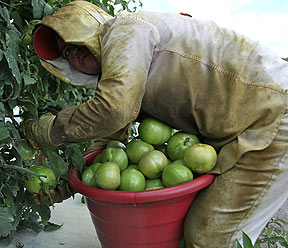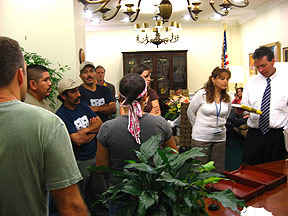December 15, 2008
 BREAKING NEWS…
BREAKING NEWS…
In an article published in Sunday’s Ft. Myers News-Press (“Specter of slavery persists in fields,” 12/14/08), Mr. Terence McElroy, a spokesperson from the Florida Department of Agriculture and Consumer Services, had this to say about the rash of modern-day slavery prosecutions in Florida’s fields over the past decade:
“Of course, I say any instance is too many, and any legitimate grower certainly does not engage in that activity (slavery) but you’re talking about maybe a case a year.” (emphasis added)
The reporter had been referred to Mr. McElroy for comment by Governor Charlie Crist’s office after the governor himself declined to address the problem of forced labor in Florida’s fields. You can read the article in its entirety by clicking here.
As our readers might imagine, the CIW doesn’t share Mr. McElroy’s perspective on the question of modern-day slavery. We do, however, thank him for his honesty. Read on below the break for the CIW’s opinion on Mr. McElroy’s revealing comment to the News-Press:
**********************
“… but you’re talking about maybe a case a year.”
When asked recently by the Ft. Myers News Press about the rash of slavery operations discovered in Florida’s fields over the past decade, and the successful prosecution of more than a dozen Florida farm bosses over that period by the US Department of Justice, Terence McElroy, spokesman for the state’s Department of Agriculture and Consumer Services, said:
“Of course, I say any instance is too many, and any legitimate grower certainly does not engage in that activity (slavery) but you’re talking about maybe a case a year.” (“Specter of slavery persists in fields,” Ft. Myers News-Press, 12/14/08)
Mr. McElroy’s moment of honesty is remarkable for its callous dismissal of real human suffering. The fact that it comes as part of a story about workers who were chained and locked inside u-haul trucks, beaten and forced to pick tomatoes, only underscores the chilling contempt Mr. McElroy clearly feels for the human rights of those who pick our state’s fruits and vegetables.
But, oddly enough, Mr. McElroy’s words may have actually done Florida’s farmworkers a favor. With his words, Mr. McElroy finally makes plain what Florida’s governors have all too long obscured with their silence: Florida officials simply don’t consider farm labor slavery to be a problem they need to address.
For decades, the silence of Florida’s governors in the face of the brutal exploitation of the state’s farmworkers has allowed that exploitation — up to and including modern-day slavery — to persist. Never mind that the slavery cases Mr. McElroy referred to were not individual workers forced to pick fruit against their will, but rather, taken as a whole, involved well over 1,000 workers since 1997 alone. Never mind that a federal prosecutor called Immokalee, Florida, “ground zero for modern-day slavery” in the wake of one particularly brutal case. Indeed, despite a steady drumbeat of slavery prosecutions, innumerable newspaper and documentary exposés, and the repeated intervention by federal officials from the US Senate to President Bush, Florida’s governors have remained unmoved by the plight of the state’s farmworkers.
And now, thanks to Mr. McElroy, we know why. In Tallahassee, modern-day slavery just doesn’t matter.
 Never was this more apparent than just over a year ago, when a delegation of workers from Immokalee — after requesting a meeting from Governor Crist’s scheduler and being rebuffed — traveled 8 hours to Tallahassee to request a meeting in person. The governor, though in his office at the time of the visit, refused to meet with the delegation from Immokalee. An aide (far right, with tie) was sent to the receptionist’s area to tell the workers that if they want to meet with the governor, they should request a meeting… through his scheduler.
Never was this more apparent than just over a year ago, when a delegation of workers from Immokalee — after requesting a meeting from Governor Crist’s scheduler and being rebuffed — traveled 8 hours to Tallahassee to request a meeting in person. The governor, though in his office at the time of the visit, refused to meet with the delegation from Immokalee. An aide (far right, with tie) was sent to the receptionist’s area to tell the workers that if they want to meet with the governor, they should request a meeting… through his scheduler.
Before leaving without a meeting, the farmworker delegation left a gift for Governor Crist, a copy of the new bestseller “Nobodies: Modern American Slave Labor and the Dark Side of the New Global Economy” by John Bowe, based in large part on the CIW’s work to combat modern-day slavery in Florida’s fields, highlighting the investigation and prosecution of a particularly violent slavery operation based in Lake Placid, Florida. The workers signed the book and inscribed it with the following message:
“Dear Governor Crist – We hope that reading this book will awaken your interest in our reality and our struggle.“
Since the workers’ frustrating trip to Tallahassee, the silence from Governor Crist’s office has remained deafening.
And since the workers’ trip to Tallahassee, yet another case of modern-day slavery in Florida’s tomato fields was discovered — on Governor Crist’s watch, this time right here in Immokalee. The case, called “slavery plain and simple” by US Attorney Doug Molloy, was in fact the second slavery case that year, following another case from North Florida.
It is incumbent on Governor Crist to clarify — now — whether he shares Mr. McElroy’s perspective that one case of modern-day slavery a year represents a manageable level of exploitation. We are sure that his answer will be of particular interest to those farm bosses currently holding workers against their will — those bosses whose operations are active case files on law enforcement authorities’ desks today.
But words alone are no longer enough. Any condemnation of the exploitation of our state’s farmworkers from Tallahassee, if it is to be anything more than political damage control, must be coupled with action. Governor Crist can begin by demanding that the Florida Tomato Growers’ Exchange end its efforts to nullify the agreements reached between the CIW and the leading fast-food buyers of Florida tomatoes to improve farmworker wages and working conditions.
Senator Bernie Sanders said it best, following his visit to Immokalee earlier this year: “The extreme is slavery. The norm is a disaster.” Governor Crist must break his silence, not just on the issue of slavery, but on the inhumane treatment of Florida’s farmworkers across the board, and on the culture of cynical disdain for human rights that pervades the Florida agricultural industry and makes slavery possible in the 21st century. If he does this, we can look forward to working with Governor Crist to make 2009 not just a new year, but a new day for our state’s worst-paid, least-protected workers.
